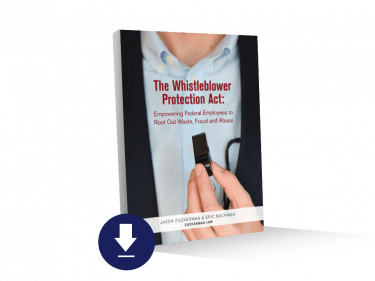Proving Retaliation in a Whistleblower Protection Act Case
In a WPA action, the complainant must demonstrate a causal connection between the protected activity and the retaliatory personnel action. The MSPB interprets causation broadly and considers any factors that tend to affect the outcome of the personnel action. The whistleblower can show causation using either:
- The knowledge-timing tests; or
- Offering circumstantial evidence of causation.
Knowledge-Timing Test
An employee can show causation using the knowledge-timing test by proving both:
- The official taking the personnel action knew of the disclosure; and
- The personnel action occurred within a period of time where a reasonable person may conclude that the disclosure was a contributing factor in the personnel action.
(5 U.S.C. § 1221(e)(1).)
Once the employee demonstrates the official’s knowledge and timing, the employee has established a prima facie case of retaliation. It is improper for the administrative judge (AJ) to consider further evidence on the issue of causation (Carey v. Dep’t of Veterans Affairs, 93 M.S.P.R. 676, 681–82 (2003)).
Circumstantial Evidence of Causation
If the employee fails to demonstrate both knowledge and timing, the MSPB considers available circumstantial evidence to determine whether any other factor potentially affected the outcome of the personnel action (see Jones v. Dep’t of Interior, 74 M.S.P.R. 666, 678 (1997) (failing to find contributing factor); see also Marano v. Dep’t of Justice, 2 F.3d 1137, 1143 (Fed. Cir. 1993)).
Guide to the Whistleblower Protection Act
Whistleblower attorneys Eric Bachman and Jason Zuckerman, former senior officials at the U.S. Office of Special Counsel, have released a guide for federal employee whistleblowers titled The Whistleblower Protection Act: Empowering Federal Employees to Root Out Waste, Fraud and Abuse and is available for download by clicking here.
Drawing on their experience enforcing the WPA at OSC and representing whistleblowers in private practice, the guide provides an overview of the WPA and offers practical tips for navigating some of the challenging issues that often arise in whistleblower cases. Topics covered include:
- What Disclosures are Protected Under the Whistleblower Protection Act?
- Does the Whistleblower Protection Act Protect Employees Who Exercise an Appeal or Grievance Right?
- Prohibited Forms of Whistleblower Retaliation
- Proving Knowledge of Protected Whistleblowing
- Proving Causation
- What is an Agency’s Burden to Avoid Liability Once the Whistleblower Has Proved Causation?
- Seeking Relief from Retaliation
- Election of Remedies
- Can OSC Seek a Stay of a Personnel Action?
- Damages or Remedies for Retaliation
- Gag Orders and Non-Disclosure Agreements
Experienced Washington DC Whistleblower Protection Act Lawyers

- Eric Bachman served as Deputy Special Counsel, Litigation and Legal Affairs, OSC, where he spearheaded an initiative to combat whistleblower retaliation at the Department of Veterans Affairs. During Bachman’s tenure at OSC, the number of favorable actions for whistleblowers increased by over 50% agency-wide.
- Jason Zuckerman served as Senior Legal Advisor to the Special Counsel at OSC, where he worked on implementation of the Whistleblower Protection Enhancement Act and several high-profile investigations.
The firm has represented whistleblowers testifying before the House Financial Services Committee and vigorously opposed efforts to silence whistleblowers. The whistleblower protection lawyers at Zuckerman Law have also helped federal employees combat unlawful gag provisions in agency policies or agreements.
If you are seeking representation in a whistleblower protection case, click here, or call us at (202) 769-1681 to schedule a free preliminary consultation. And to learn more about whistleblower protections for federal employees, see Whistleblower Protections Under the Whistleblower Protection Act.








